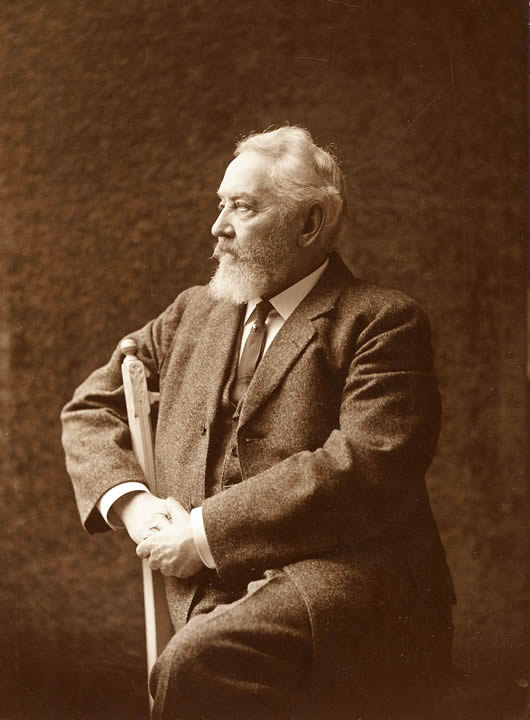Rossiter Raymond Address at Anton Eilers’ Funeral

This address from Rossiter Raymond, long time friend of Anton Eilers, was printed in Anton’s 1920 memorial book.
To my thought, it is not out of place, on an occasion like this, after the solemn words of Hoy Church have been spoken, that there should be heard also the familiar, homely, heart-felt words of human friendship, in witness of love and gratitude and grief. Especially appropriate is such testimony when it voices not merely the tribute of one, but the unspoken declaration of all. You all knew Anton Eilers—though perhaps none, outside of his own kindred, for so long a time as I—; and you all loved and trusted and admired him; and you all mourn him sincerely, and will miss him keenly. It was peculiarly true of him that he was the same to all of us always. He lived no double life. If you had but a slight acquaintance with him you possessed a picture of his character which further acquaintance would not alter, but only color and complete. And so I am sure that the words I speak to-day will find instant echo in the hearts behind the tearful eyes into which I look while I speak!
He and I were nearly of the same age. We were married within a few days of each other, and for fifty-four years we have been together—close together sometimes, less close at other times, yet never wholly apart—in the companionship of the camp, the field, the mountain trail, the mine, the smelting works, above all, the household and the family. In the early days we explored a new continent together. In later days, his home—at Salt Lake, Denver, Leadville, Pueblo, Brooklyn, Sea Cliff—was always my home, whenever I came under its hospitable roof. Now that I look back over more than half a century, I cannot recall a single occasion of even temporary and passing discord to mar that perfect friendship.
He was at first my employee, then my assistant in public service, and then, to the day of his death, my business associate. I have seen him under circumstances of hardship, peril, conflict, doubt apprehension, discomfort—and discomfort is no mean enemy to the sovereignty of a man over himself and his fate;—but always and everywhere he was the same simple, earnest, upright, thorough, dauntless, generous soul. He could not do a mean or tricky thing. More than once I have heard him say of some plausible business scheme, “That would convenient and profitable; but we couldn’t do it, you know!” What he said, he meant; what he promised, he performed. In business dealings he matched with his transparent honesty, frankness and justice the skillful strategy of other men. Over and over again, disputes have been settled by the final decision, “Let’s leave it to Eilers!” Both sides rested content with the verdict of this fair-minded, incorruptible man, who incarnated in these modern days the ancient motto, “Noblesse oblige!” without preaching and without pretense.
Many years ago I wrote concerning another friend, unlike Eilers in the outward circumstances of his life and work, yet exhibiting the same undeviating truth and beauty of character, a sonnet which I take the liberty of reading here, as both true and pertinent.
THE DOER OF THE WORD
Not thine in lofty words to celebrate
The deeds of other men, or to declare
How honor, courage, kindliness are fair;
How happy homes make strong the welded State;
How they who draw the path of duty straight
And tread therein unswerving, without boast,
Of all God’s loyal servants do the most
To cast up for His feet the highway great.
Yet with a clearer language dist thou speak
Than poet’s song or preacher’s tongue of fire
That truth, to utter which mere speech is weak;
And thee not less we gratefully admire,
Who quietly hast lived the life they seek
By their high words in all men inspire.
So, this is my farewell to one of the staunchest, truest, noblest, dearest friends that ever a man had!
And yet—and yet—can this be the end? Love say, No! and Science says, No! For the very existence of science demands the assumption of a rational universe. Nature must not tell us lies. Her evidence must be interpretable. And science, starting on that basis of faith in honest evidence, has discovered not only order but purpose in the evolution of the universe. We can read the progress of that purpose in ages past, from primordial slime through the ascending forms of life, to savage man, barbaric man, civilized man—through specific features to personality. Science confirms the poet who says, “An honest man’s the noblest work of God.” And science cannot receive with respect the conception of a Being who would spend aeons in careful, patient preparation to bring forth a man only to destroy him 00 a God blowing bubbles, and, just when such a radiant sphere has reached its brightest rainbow glory, dashing it into mist, in order to begin another with futile inflation. How childish, how absurd! No; we demand a reasonable universe and a respectable God—we students of science. We will not accept the notion that early death ends all. It is too ridiculous!
Therefore, we say over this outworn body to the spirit invisible of our dear friend, not Lebewohl, but Auf Wiedersehen.